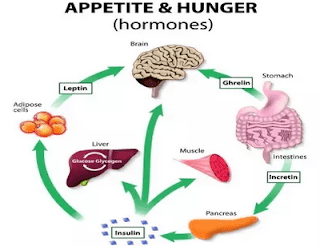Eating the right foods at specific times throughout the day (when your body needs them most) curbs hunger hormones and dulls cravings.
Tuning into your body’s natural refuel schedule keeps hormones balanced, which energizes you during the day and calms you right before you go to sleep.
Early Morning: Once you are awake, even if it feels like you should still be sleeping, ghrelin wakes up. Ghrelin is the "feed me" hormone that’s made in your stomach. Ignore ghrelin and not only do you set the stage for cravings later on, but skipping breakfast messes up your natural hormonal cycle.
Once ghrelin is awake, neuropeptide Y (NPY), is a gut hormone that regulates appetite and the craving for carbohydrates. If you don’t satisfy NPY, it will keep building all day.
A small serving of healthy carbs–such as adding veggies to an omelet or whole-grain toast–will keep NPY from nagging you all morning and ultimately triggering the junk food craving.
So, within an hour of waking up, make sure you have a relatively big breakfast that contains both complex carbs (like whole-grain bread (not refined grains) or cereal and/or veggies), and protein (like eggs, egg whites, low-fat cheese).
The complex carbs and protein slow your blood sugar’s rise and suppress ghrelin longer. The food you eat in the morning has a higher satiety level (makes you feel fuller) than the food you eat at night.
A breakfast that is 60 percent complex carbohydrates, 30 percent bio-available protein, and 10 percent fat, balances your appetite control center, restores your glycogen levels, and diminishes NPY levels.
It also raises your dopamine (feel alert) and DHEA (high enthusiasm, vibrant energy) hormones so your mood is balanced but elevated.
Cholecystokinin is released from the protein in the stomach and intestines, sending a message of complete satiation to your brain. Insulin levels are balanced and you feel full, energetic, alert, and bright for four full hours.
Mid-Morning: A couple of hours before lunch, ghrelin begins to rise to remind you to eat. Most of us will find a quick fix for those hunger pains, but it’s usually not the right fix! You want to turn ghrelin off so that you don’t continue to have cravings.
If you eat complex carbs and protein together you turn ghrelin off. So, have a small combo snack. The carbs will shut off ghrelin and the protein keeps it turned off longer. The mid-morning snack should be halfway between your breakfast and lunch.
Lunch: Here we go again! Ghrelin is back! However, this time we also now have galanin. Galanin is a hunger hormone that makes you want to eat fat. It starts up around midday and peaks in the evening.
Now, we know that eating a high-fat lunch is not a good idea and the body feels stressed, especially since you still need to satisfy ghrelin! Fatty foods do not suppress the “eat more” effects of ghrelin as well as carbs and protein do; they barely satisfy them at all.
In addition, dietary fat promotes the production of more galanin, which then tells you to eat more fat!
Yes, it is a messy circle that we all get caught up in!
Lunch is the meal to emphasize low-density carbohydrates that are minimally processed, as well as lean proteins, containing the amino acid tyrosine, which makes the “stay sharp” hormone dopamine.
High dopamine levels in the early afternoon help keep us alert, vigilant, and motivated. The ideal lunch would be predominantly vegetables with lean protein. The key to lunch isn’t just what you eat, but when. And, it’s best to eat your midday meal at the same time every day.
Mid-Afternoon: It’s at this point in the day (approximately 3 PM) that your body temperature drops; so does blood sugar, triggered by insulin secretion after your lunch. Leptin also hits the bottom.
So, here comes the next wave of cravings! This is a great time for a protein-rich snack, like a turkey roll-up or some string cheese. Again, the amino acid tyrosine found in protein, promotes alertness, making protein your best afternoon pick-me-up food.
Dinner: Your body produces ghrelin and galanin again. Ghrelin is telling you to eat and galanin wants you to eat fat; because it wants to make sure that you have enough calories in your system to keep you from waking up at night.
This is a great time to load up on healthy fats like those in olive oil and fish. Yes, you want to eat enough to stay asleep, but don’t overdo it, it is fat after all! The ideal dinner should contain twice as many complex carbohydrates as lean protein.
Good carbohydrate choices can be whole grains such as millet, amaranth, quinoa, Kamut, wild rice, brown rice, baked yam, baked sweet potato, colorful salads, squashes, whole grain pasta or bread, or soba noodles.
The "feel-good" hormone serotonin rises from the complex carbohydrates and low protein eaten at dinner, leaving you satisfied, tranquil, and calm. Neuropeptide Y levels decline as do galanin (fat craving) levels, which curbs your appetite.
Complex carbohydrates in the evening also create tryptophan, which promotes good sleep patterns.
In addition, carbs are necessary to fill your glycogen storage tanks, to supply the brain and millions of nighttime metabolic processes with the fuel-mix blood glucose, so you can have an uninterrupted sleep without the urge to refuel midway through the night.
I know I did not say much about fruits. Yes, fruits should be included in your daily food intake, but in moderation; although fruits pack a good amount of fiber, they are also sugar.
Yes, fructose, although a natural sugar found in the fruit, is still sugar. So enjoy, but don’t overdo it.
Tuning into your body’s natural refuel schedule keeps hormones balanced, which energizes you during the day and calms you right before you go to sleep.
Early Morning: Once you are awake, even if it feels like you should still be sleeping, ghrelin wakes up. Ghrelin is the "feed me" hormone that’s made in your stomach. Ignore ghrelin and not only do you set the stage for cravings later on, but skipping breakfast messes up your natural hormonal cycle.
Once ghrelin is awake, neuropeptide Y (NPY), is a gut hormone that regulates appetite and the craving for carbohydrates. If you don’t satisfy NPY, it will keep building all day.
A small serving of healthy carbs–such as adding veggies to an omelet or whole-grain toast–will keep NPY from nagging you all morning and ultimately triggering the junk food craving.
So, within an hour of waking up, make sure you have a relatively big breakfast that contains both complex carbs (like whole-grain bread (not refined grains) or cereal and/or veggies), and protein (like eggs, egg whites, low-fat cheese).
The complex carbs and protein slow your blood sugar’s rise and suppress ghrelin longer. The food you eat in the morning has a higher satiety level (makes you feel fuller) than the food you eat at night.
A breakfast that is 60 percent complex carbohydrates, 30 percent bio-available protein, and 10 percent fat, balances your appetite control center, restores your glycogen levels, and diminishes NPY levels.
It also raises your dopamine (feel alert) and DHEA (high enthusiasm, vibrant energy) hormones so your mood is balanced but elevated.
Cholecystokinin is released from the protein in the stomach and intestines, sending a message of complete satiation to your brain. Insulin levels are balanced and you feel full, energetic, alert, and bright for four full hours.
Mid-Morning: A couple of hours before lunch, ghrelin begins to rise to remind you to eat. Most of us will find a quick fix for those hunger pains, but it’s usually not the right fix! You want to turn ghrelin off so that you don’t continue to have cravings.
If you eat complex carbs and protein together you turn ghrelin off. So, have a small combo snack. The carbs will shut off ghrelin and the protein keeps it turned off longer. The mid-morning snack should be halfway between your breakfast and lunch.
Lunch: Here we go again! Ghrelin is back! However, this time we also now have galanin. Galanin is a hunger hormone that makes you want to eat fat. It starts up around midday and peaks in the evening.
Now, we know that eating a high-fat lunch is not a good idea and the body feels stressed, especially since you still need to satisfy ghrelin! Fatty foods do not suppress the “eat more” effects of ghrelin as well as carbs and protein do; they barely satisfy them at all.
In addition, dietary fat promotes the production of more galanin, which then tells you to eat more fat!
Yes, it is a messy circle that we all get caught up in!
Lunch is the meal to emphasize low-density carbohydrates that are minimally processed, as well as lean proteins, containing the amino acid tyrosine, which makes the “stay sharp” hormone dopamine.
High dopamine levels in the early afternoon help keep us alert, vigilant, and motivated. The ideal lunch would be predominantly vegetables with lean protein. The key to lunch isn’t just what you eat, but when. And, it’s best to eat your midday meal at the same time every day.
Mid-Afternoon: It’s at this point in the day (approximately 3 PM) that your body temperature drops; so does blood sugar, triggered by insulin secretion after your lunch. Leptin also hits the bottom.
So, here comes the next wave of cravings! This is a great time for a protein-rich snack, like a turkey roll-up or some string cheese. Again, the amino acid tyrosine found in protein, promotes alertness, making protein your best afternoon pick-me-up food.
Dinner: Your body produces ghrelin and galanin again. Ghrelin is telling you to eat and galanin wants you to eat fat; because it wants to make sure that you have enough calories in your system to keep you from waking up at night.
This is a great time to load up on healthy fats like those in olive oil and fish. Yes, you want to eat enough to stay asleep, but don’t overdo it, it is fat after all! The ideal dinner should contain twice as many complex carbohydrates as lean protein.
Good carbohydrate choices can be whole grains such as millet, amaranth, quinoa, Kamut, wild rice, brown rice, baked yam, baked sweet potato, colorful salads, squashes, whole grain pasta or bread, or soba noodles.
The "feel-good" hormone serotonin rises from the complex carbohydrates and low protein eaten at dinner, leaving you satisfied, tranquil, and calm. Neuropeptide Y levels decline as do galanin (fat craving) levels, which curbs your appetite.
Complex carbohydrates in the evening also create tryptophan, which promotes good sleep patterns.
In addition, carbs are necessary to fill your glycogen storage tanks, to supply the brain and millions of nighttime metabolic processes with the fuel-mix blood glucose, so you can have an uninterrupted sleep without the urge to refuel midway through the night.
I know I did not say much about fruits. Yes, fruits should be included in your daily food intake, but in moderation; although fruits pack a good amount of fiber, they are also sugar.
Yes, fructose, although a natural sugar found in the fruit, is still sugar. So enjoy, but don’t overdo it.




